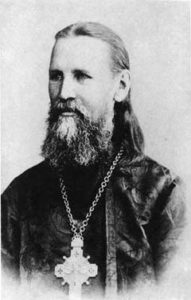SSCORRE!
Saint Sophia Cathedral
Online Resources for our Religious Edification

Topic of the Week – On the Slavery of Habits
Every Christian person struggles constantly with the fact that despite the desire often very sincere to live a Godly life, to live in a holy way, we find ourselves constantly repeating patterns of sin, patterns of impure thought, of action, of behavior, word and deed….
But so often we don’t see our little habits here and there, as enemies, as obstacles, as things which exercise tyranny over us and so they become part of us, part of our daily life. As Saint John says, it’s not without reason that they can be called almost our second nature….
When I constantly act in a certain immoral way, Saint Ignatius says, that action, that habit, shackles me so that when I’m faced with a choice – do I behave thus or differently…. I naturally, it seems, act in this sinful manner.
Our second nature may be the one that rules us day-to-day, but it is NOT our true nature.
So how do we overcome these habits which become so fundamental to our day-to-day lives?…”
Read On the Slavery of Habits or listen here Holy-Fathers-on-the-
Slavery-of-Habits.mp3
Adult/Family:
“Do not neglect to uproot from the hearts of children the tares of sins, impure, evil, and blasphemous thoughts, sinful habits, inclinations, and passions; the enemy and the sinful flesh do not spare even children; the seeds of all sins are to be found in the children too; show them all the danger of sin on the path of life; do not hide sins from them lest through ignorance and want of comprehension they should be confirmed in sinful habits and attachments, which grow stronger and stronger and bring forth corresponding fruits when the children grow up.” Excerpted from My Life in Christ, p 136, Saint John of Kronstadt
Read On the Slavery of Habits or listen here Holy-Fathers-on-the-Slavery-of-Habits.mp3 Consider purchasing these for teaching your younger children about good habits: Laying Down the Rails Resources, Laying Down the Rails, Laying Down the Rails for Children: A Habit-Training Companion
Preschool:
Read and discuss some of these lessonsabout courtesy or kindness.
Elementary School:
“When praying to the Lord, to the Mother of God, or to the saints, always remember that the Lord will give you according to your heart….
Therefore… call upon them with all your heart; [when] you pray…that you or anyone near to you may be delivered from any misfortune, or from sins, passions, or bad habits, pray for this with your whole heart, desiring for yourself or others with your whole heart the blessings you pray for, being firmly resolved to forsake, or desiring others to free themselves from sins, passions and sinful habits, and the Lord will grant you the gift according to your heart….”
Excerpted from My Life in Christ, p193 Saint John of KronstadtMiddle School:
“At the root of our woes lie our bad habits. Habits (or passions) are never passive. They fight against us, and against our happiness and love. If we do not overcome bad habits, they overcome us.
Who we are and what we do are not one and the same thing. We want to be charitable, but instead we are greedy. We want to be generous, but we are afraid to be so. We want to be free, but we remain dependent. We want to become stronger and better, but we wreak havoc upon ourselves. We want to forgive, but instead we take offense. We want to rejoice over others’ success, but instead we envy. We want to love others, but instead are jealous of, and hate them.
What, in our better moments, we want to do, is who we are. Deep down inside, we are real, perfect creatures after the likeness of God…. Love turns us into what we are: in our true, normal condition, we love.
What we do not want to do, but yet do, are bad habits or passions… [which] are in part inherited, and in part are acquired over the course of life.
There is something pleasing or at least entertaining in many bad habits; otherwise, we would not so easily succumb to them. But ultimately, each of those habits interferes with our being what we are, i.e. with being loving creatures…. To be a loving person is a faculty of the entire, whole person. One cannot be internally divided, towards some a loving person, and towards others, a mean one….
Passions, bad habits, are a sickness of the soul, and like any sickness, bad habits intensify, with one bad habit intensifying another. A person’s soul cannot remain static; it is constantly in motion, moving either toward good or toward evil.
Therefore, to become a true, loving person, one capable of building up and bringing joy to others, it is essential to struggle against one’s bad habits, to overcome one’s passions and not allow new evil habits to appear.
If we do not defeat our habits, they overcome in us all that is good. The province of slaves to bad habits is a twisted attitude towards things, is slavery and suffering.
Anyone can overcome his bad habits. Every believer who has suffered from some passion or from attacks of obsessive thoughts, knows how much prayer helps in that time of trial.However, he also knows that even more helpful than prayer is confession of that passion, followed by Communion of the Holy Gifts of Christ. The Mystery is a miracle! Mankind possesses nothing more powerful in resolving spiritual problems.“Read the entire article How Can We Overcome Our Bad Habits?
High School:
“A central element of the Orthodox way of life is repentance. We are continually recognizing our shortcomings in our life as lived when compared to the life God calls us to live. As Orthodox Christians we grow by continually seeking forgiveness and committing ourselves to change in our behavior. We fast, pray and participate in the Sacraments of the Church to help us in this life long effort. We know that we cannot do this by our now efforts alone but we need the grace of God to become like Christ.
How often do we face this issue of going back to confession with the same issue time after time? What makes this process so difficult is that we are mostly focused on our body and our brain has taken control from the soul. In our brain there are trillions of neural connections that program us to act in habitual ways. The task is to be able to overcome these preprogrammed habits and to recreate new habits that are congruent with the teachings of Christ.
Read On the Slavery of Habits or listen here Holy-Fathers-on-the-
Slavery-of-Habits.mp3 Read Orthodox Way of Life for concrete suggestions on how to break habitual repetitive sins. While the example he uses is for skipping prayer, what other habits do you have (“short temperedness, arrogance, responding too quickly when someone wrongs us, overtalkativeness, inquisitiveness” etc) and how can you use this method to discontinue doing them?
A Message from Maria Spanos
I am passionate about our Orthodox Christian faith and seek to help others learn as much as they can about it. My purpose here is to share online resources that help strengthen our relationship with Christ and bind us closer to His Church. I believe they are invaluable in learning about our precious Orthodox Tradition, and are a great aid for teaching family members, friends and others about Orthodoxy. ~Maria
Two of my favorite quotes:
 “A true Christian behaves in this life so that it may be a preparation for the future one and not only a life here below. In his actions, he does not think what will be said of him here but of what will be said there in heaven; he represents to himself that he is always in the presence of God, of the angels and all the saints, and remembers that someday they will bear witness of his thoughts, words, and deeds.” — Saint John of Kronstadt
“A true Christian behaves in this life so that it may be a preparation for the future one and not only a life here below. In his actions, he does not think what will be said of him here but of what will be said there in heaven; he represents to himself that he is always in the presence of God, of the angels and all the saints, and remembers that someday they will bear witness of his thoughts, words, and deeds.” — Saint John of Kronstadt
__________________________________________________________

“Of all the holy works, the education of children is the most holy.”
— St. Theophan the Recluse






